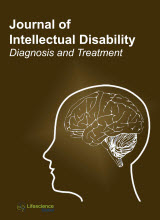jiddt
|
|
Abstract: The authors present a synthesised review of the methods for assessing mental development and autism, with an emphasis on the general tendency to reduce the age of diagnosis. Based on clinical experience, a number of particularities are described in terms of: testing, working with parents, observing and reflecting on the nature and meaning of autistic behaviours. On focus is a toolkit for detailed assessment of mental development that was elaborated within the inter-university cooperation between Sofia Medical University and Université catholique de Louvain (UCL) - Belgium. Illustrated and discussed are typical profiles of cognitive and socio-communicative functioning of children with ASD and other neurodevelopmental disorders, which help a differential diagnosis to be made by the multidisciplinary clinical team. Further described are the advantages of early assessment of mental development as a basis for future educational and therapeutic programs. Keywords: Autism Spectrum Disorder (ASD), Neurodevelopmental Disorders (NDDs), early assessment of child development, mental developmental profiles. |
|
|
Abstract: The authors, child psychiatrists and clinical psychologists, conducting team assessment of children with developmental disabilities (including autism spectrum disorder) for more than two decades, present some important in their view issues and recommendations concerning planning and proceeding of assessment and post-assessment meetings with parents. It is essential to ensure not only an accurate assessment protocol and diagnosis, but also to “attune” to parents in order to facilitate their understanding and more positive use of assessment outcome results. Parents need further support to “survive” psychically the post - assessment period and to provide for adequate interventions for their child. Keywords: ASD, children, parents, assessment, post-assessment meeting, assessment team. |
|
|
Abstract: This study aimed to show the significant relationships between emotion and behavior variables among throughout the behavioral modification learning processes in individuals with Autism Spectrum Disorder (ASD). A quasi- experimental research design pre- tests - post- test was realized. A total of 10 years old children with ASD level 1, who have been distributed into two groups, an experimental group (n= 5), whom a sensory integrated behavior program was applied and a control group (n=5), whom a behavioral modification “Stimulus”- “Response”- “Readjustment” (S-R) program has been applied. Results found through Mann-Whitney U Test and Pearson Correlation Test showed that there´re significant differences between both groups and, above all, great relationships are indicated between the emotional and behavioral variables found as a result of the learning process. Keywords: Autism Spectrum Disorders, Behavior, Emotion, Sensory Integration. |
|
|
Abstract: Children with Autism Spectrum Disorder (ASD) often demonstrate disturbed sleep behaviors that negatively impact daytime behavior. The purpose of this study was: 1) To determine if participation in aquatic exercise improves sleep duration in children with ASD, and 2) to examine the social validity of the intervention. A within-subjects crossover design over an 8 week period was used. Participants were assigned to the intervention (aquatic exercise 2x/ week for 1 hour) or the control (no exercise) condition for 4 weeks; they then switched conditions for 4 weeks. Sleep habits were recorded using the EMFIT QS sleep monitor. The IRP-15 was administered to parents after completion of the intervention to establish social validity. Mean sleep duration for intervention versus control was compared using the Wilcoxon-Signed Ranks Test. Statistically significant improvements (p=0.012) in sleep duration were observed (intervention: 9.27 hours vs control 8.37 hours). Descriptive statistics were used to analyze IRP-15 data indicating the majority of parents strongly agreed that aquatic exercise had a positive effect on their child’s sleep. Results suggest that participation in an aquatic exercise program may lead to improved sleep duration in children with ASD, and is a socially valid intervention. Keywords: Autism Spectrum Disorder, sleep, aquatic exercise. |
|
|
Abstract: Research on the autism spectrum (AS) has expanded tremendously over the last two decades with exciting insights into underlying neurobiology. Neuroplasticity, the remarkable ability of the brain to form new connections as a result of experience, is not limited to specific parts of the brain nor does it have a time limit meaning that growth and learning are on-going processes. In this review we explore the impact of the attitude of acceptance, enthusiasm and learning through motivation on brain development in children on the AS. The first part of the review focusses on the impact of attitude on social, emotional and cognitive development, while the second part focusses on the impact of attitude on brain biology. Keywords: Autism, attitude, acceptance, enthusiasm, motivation, neurobiology. |


